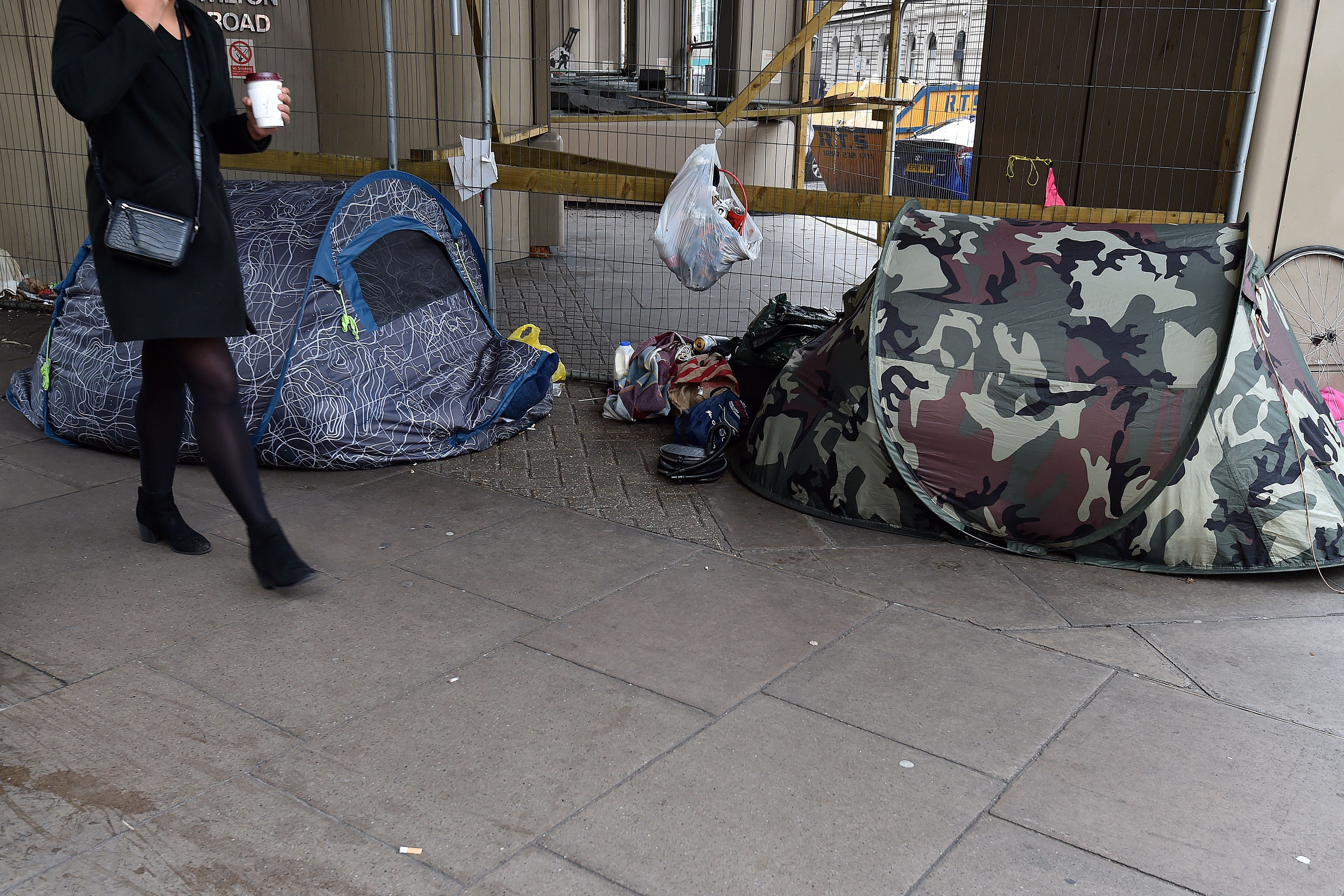Next government urged to act as London rough sleeping figures hit record high
Charities said the occupant of Number 10 after July 4 must treat homelessness as an emergency and prioritise it in their first 100 days.

Your support helps us to tell the story
From reproductive rights to climate change to Big Tech, The Independent is on the ground when the story is developing. Whether it's investigating the financials of Elon Musk's pro-Trump PAC or producing our latest documentary, 'The A Word', which shines a light on the American women fighting for reproductive rights, we know how important it is to parse out the facts from the messaging.
At such a critical moment in US history, we need reporters on the ground. Your donation allows us to keep sending journalists to speak to both sides of the story.
The Independent is trusted by Americans across the entire political spectrum. And unlike many other quality news outlets, we choose not to lock Americans out of our reporting and analysis with paywalls. We believe quality journalism should be available to everyone, paid for by those who can afford it.
Your support makes all the difference.Rough sleeping in London has reached a record high with the increase branded “appalling” and the next government urged to “act decisively to address this crisis”.
A total of 11,993 people were seen rough sleeping in London in the year to March, according to the latest Combined Homelessness and Information Network (Chain) statistics.
It is the highest figure ever recorded in the database for a single year and was up by 58% on the total of 7,581 people seen rough sleeping 10 years ago, in 2014/15.
Homeless Link, the membership body for frontline homelessness services in England, warned the incoming government it “cannot continue to kick the can down the road” on tackling homelessness and rough sleeping.
Rick Henderson, chief executive of the organisation, which manages the Chain database, described the increase as “appalling” and said there is a “crisis, both in the capital and across the country”.
He said the next ruling party at Westminster “must create a cross-government plan to prevent rough sleeping and homelessness through delivering genuinely affordable and secure homes quickly, whilst making sure there are a diverse range of properly-funded homelessness services to help people address the root causes of their destitution and move on from rough sleeping for good”.
Almost a fifth (17%) of new rough sleepers who had information recorded about their last settled base before they ended up on the streets had previously been staying in asylum support accommodation, Chain said.
UK nationals made up 45% of all people seen rough sleeping in the year to March, compared with 49% the previous year.
Nearly a third (30%) of people came from countries in Africa, Asia, the Americas and Australasia, while a quarter were from Europe.
It is the first time in the history of the Chain database that the proportion of people seen rough sleeping from countries in Africa, Asia, the Americas and Australasia was higher than the proportion from Europe – excluding the UK.
The St Mungo’s homeless charity said the next government must “treat homelessness as an emergency and prioritise it in their first 100 days”.
By rapidly increasing the supply of good quality, genuinely affordable housing, alongside investing in specialist services, we can help people to leave the streets behind
The latest available figures for England, published in February, showed the estimated number of people sleeping rough on a single night in autumn in 2023 was 3,898 – more than twice that of the 1,768 figure in 2010.
In September 2022, the Government published its Ending Rough Sleeping For Good strategy, which re-stated its 2019 manifesto commitment to end rough sleeping by the end of that parliament.
But the Conservative goal for “rough sleeping to be prevented wherever possible but when it does occur, it must be rare, brief and non-recurring” was not met by time the parliamentary session ended in May ahead of the General Election.
The Tory manifesto has vowed to continue with plans to end rough sleeping “and prevent people from ending up on the streets in the first place, after making significant progress over the last few years”.
Labour’s manifesto pledged to “develop a new cross-government strategy, working with mayors and councils across the country, to put Britain back on track to ending homelessness”.
The Chain data showed that 7,974 people were seen rough sleeping for the first time in the year to March, up by a quarter on the number of new rough sleepers in the previous 12-month period.
Only with bold ambition and sheer determination will we create a future free from homelessness
Charity Crisis said the overall figures are “deeply shameful and highlight the desperate need for the next government to get a grip on this crisis”.
Chief executive Matt Downie said: “By rapidly increasing the supply of good quality, genuinely affordable housing, alongside investing in specialist services, we can help people to leave the streets behind.
”Only with bold ambition and sheer determination will we create a future free from homelessness.”
Social housing provider Riverside said it is “extremely disappointing, but not surprising, to see a record high number of people sleeping rough on the streets of our capital” and called for ringfenced funding for council homelessness services and a long-term commitment to more funding for building affordable homes.
Homelessness charities and campaigners have long called for a government commitment to build 90,000 social rent homes a year.
Government figures show an average of 42,381 homes for social rent were built or acquired each year in England in the 1990s and an average of 26,476 in the 2000s.
In the past decade, this has fallen to an average of 7,631.